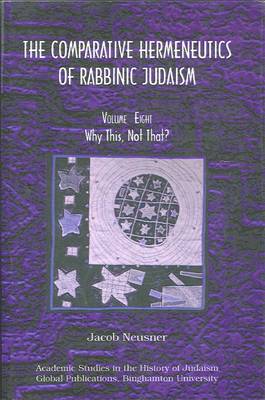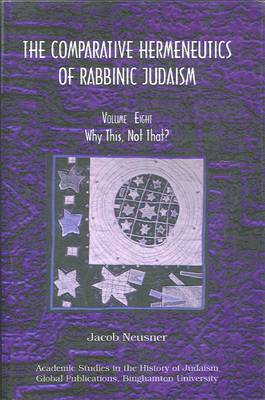
- Retrait gratuit dans votre magasin Club
- 7.000.000 titres dans notre catalogue
- Payer en toute sécurité
- Toujours un magasin près de chez vous
- Retrait gratuit dans votre magasin Club
- 7.000.0000 titres dans notre catalogue
- Payer en toute sécurité
- Toujours un magasin près de chez vous
51,95 €
+ 103 points
Description
This work both completes the project of which it is part and also stands on its own. It therefore is necessary to explain matters in their own terms and also to set the work into its context, both past and future. To state at the outset the thesis that I propose to demonstrate: in the Halakhic category-formations, each worked out in a hermeneutics particular to its topic, one can learn the principles of generic hermeneutics, with special reference to the rules of hierarchical classification. These encompass the speciation of a genus, the relationship of the species of a genus to one another, the comparison and contrast of species, the hierarchization of genera, the division of one thing into many things, the aggregation or conglomeration of many things into one thing, and related issues, all of them subject to generalization, of hierarchical classification. Accordingly, we now turn from the Halakhah's particular hermeneutics to the issues of generic hermeneutics: interstitiality, mixtures and connections, resolution of doubt, and demonstration of the many that yield the one and the one that yields the many. In each case I provide a theoretical introduction and then a rapid survey of suggestive examples, by tractates. I make no effort at including all possible cases. I cite only a sufficient number to show that the generic hermeneutics transcends the topical structure of Halakhic category-formations. In these five chapters I realize the purpose of this handbook: the demonstration that generic, not only particular, hermeneutics animate the Halakhah, transcending the bounds of the category-formations and their singular hermeneutics, a dual hermeneutics.
Spécifications
Parties prenantes
- Auteur(s) :
- Editeur:
Contenu
- Nombre de pages :
- 326
- Langue:
- Anglais
- Collection :
Caractéristiques
- EAN:
- 9781586840174
- Date de parution :
- 01-01-00
- Format:
- Livre broché
- Format numérique:
- Trade paperback (VS)
- Dimensions :
- 152 mm x 229 mm
- Poids :
- 535 g

Les avis
Nous publions uniquement les avis qui respectent les conditions requises. Consultez nos conditions pour les avis.






